Who Are We?
No, we are not just another denomination.
Neither are we inter-denominational. It is our sincere desire to be non-denominational. It is our wish and purpose to wear no other name than Christ’s, and to be known simply as Christians, members of the body of Christ-the church of Christ. Such was clearly true of the Lord’s people in the first Century (Acts 11:26; I Peter 4:16; Ephesians 1: 22, 23; Colosians 1: 18; Romans 16:16). Collectively we refer to ourselves as the church of Christ, the Lord’s church, or some other scriptural description, not in an attempt to be “sectarian,” but on the contrary, to identify ourselves as the church belonging to Christ.
Our emphasis is spiritual not material or social.
We are not concerned with the building of pretentious architectural monuments to human pride. Our building is merely a tool designed to facilitate our work and worship. While as individual Christians we seek each others’ association socially, the church is not a “front” for a social club or agency, and therefore the Lord’s treasury is not used to promote social functions. Our aim is spiritual 1 Peter 2: 5; I Timothy 3:15).
We strive to be the same church described in the New Testament.
It is our purpose to be completely identified with the Christians of the first Century. We believe this to be possible to all who will learn, believe, and be guided by the plain teaching of the word of God. Jesus declared such to be “the seed of the Kingdom” (Luke 8: 11). A fundamental truth in nature is that a specific kind of seed, when planted, will always produce after its kind. For example, wheat will produce wheat; corn will produce corn. In like manner, the word of God, when planted in the hearts of honest people, and obeyed, will produce Christians just as it did in the first Century- nothing more or nothing less. We are human, and therefore subject to error, so we recognize the possibility that we may be wrong in our application of the scriptures. But if we can be shown where we are wrong-by the scriptures-we are willing and anxious to change.
We have no human head.
There is no man, or group of men, who legislate for the church. We have no one to answer to but Christ. He is at the head of the church (Ephesians 1: 22) which leaves no room for any human head. As was true in the first century, there is no inter-congregational organization, but rather interdependent congregations in different locations with Christ as Lord and Master. According to the authority of Christ, when a congregation matures to the point where men meet the qualifications, overseers (also called bishops, elders or pastors) are appointed to look after the spiritual welfare of the congregation. Such men are appointed only when the congregation determines that they meet all the qualifications enumerated by the apostle Paul in I Timothy 3: 1-7 and Titus 1: 5-9. They then have the responsibility to “feed the flock” with the spiritual food found in the scriptures, and to be living examples for others to see (I Peter 5: 1-3). Unlike sectarian groups, our preachers are not “pastors” (unless they meet the qualifications and are so appointed) but are simply teachers of the gospel.
The Bible is our only book of rules.
Therefore we have no man-written creed books to follow. We are governed in faith and conduct by the Bible alone. While recognizing and heeding the guiding principles of the Old Testament, we seek to conform to the rules and patterns of the New Testament (I Cor. 10: 4; Hebrews 1: 1-2; I Peter 4: 11). We accept the Bible as being both verbally inspired and infallible in content (2 Pet. 1: 20-21; I Cor. 2:11-13). Consequently, when the Bible speaks upon any given subject, its pronouncement is accepted as final. By its own testimony, no one may with impunity alter a single word of it (Deuteronomy 4: 2; Proverbs 30: 6; Revelation 22:18-19).
Our plea for unity.
We plead for unity among all who obediently respond to the doctrines and commandments given in the New Testament. Such is in harmony with the prayer of Jesus and the pleadings of the apostles (John 17:20-21; I Cor. 1: 10; Ephesians 4:1-6). We consider such unity to be possible, or Jesus would not have prayed for it. We also note that unity and love for each other was a mark of discipleship in the early churches (John 13: 34-35; Acts 2: 44, 46; Acts 4: 32). And since division has always been a result of departure from “the faith which was once delivered to the Saints” (Jude 3), we believe division can be healed by a return to the revealed truth of God’s word. For this we plead.

